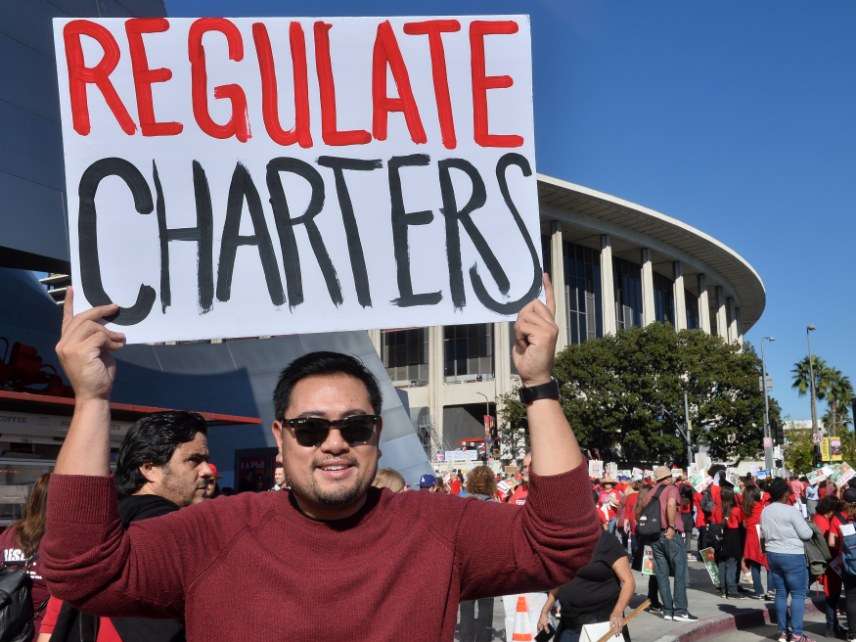A Charter School Moratorium Will Not Fix What Ails L.A.'s Education System
The district's budget is broken, and the latest deal with the unions will make it worse.

In 2017, Los Angeles voters put supporters of school choice in the majority overseeing the Los Angeles Unified School District (LAUSD). It was a big deal at the time. Charter schools are very popular in L.A.—there's more than 200 of them serving more than 100,000 students.
But this week that same school board, apparently as part of the negotiations to end the teachers' strike, voted 5–1 to support a resolution calling for a temporary moratorium on new charter schools. Even though thousands of charter school supporters showed up for the meeting, even board members who have expressed public support for choice voted in favor of a moratorium while a "study" of charters' impact is completed.
The sole "no" vote came from Nick Melvoin, one of the school choice advocates who swept into office in 2017, defeating then-president Steve Zimmer, who supported efforts to restrict charter school growth.
The good news is that the resolution is, on paper, meaningless. The State of California sets the rules for creating charter schools, and the LAUSD board lacks the power to actually enforce a moratorium. So what the resolution actually authorizes is for LAUSD staff to research a plan to change the laws so that a moratorium could be put into place. (Read the resolution here.)
The unions have an ally of sorts in Gavin Newsom, the state's new governor. Newsom insists that he supports charter schools, but he also says he wants some sort of "transparency" legislation and more regulation of charter-school operations. Regulatory tools have sometimes been used to shut down charter schools even when they're performing well and have support from parents, but there are also charter schools that have turned out to be scams.
But there's a certain level of blatant disingenuous concern-trolling here. This isn't about transparency, and it's not about whether charter schools have been appropriately studied. There are lots of studies about charter school out there that show that they're good for student performance. (Reason's Nick Gillespie took note of them here.)
This is about the financial impact on the public school system when parents can decide where to send their kids. When a child is sent to a charter school, the funding follows the child. The more parents send their kids to charter schools, the more money gets taken away from the public schools (though charter schools are themselves technically public schools operated by private non-profits). And Los Angeles has seen significant growth in charter attendance over the past decade.
This is a feature, not a bug: It's a way to introduce competition to a public-school setting and give educators an incentive to do better. The LAUSD's resolution is equivalent to McDonald's trying to force a moratorium on building new Burger Kings. Note that absolutely nothing in the resolution indicates an iota of concern about the interests of the district's ostensible customers. There's literally no reference to either students or parents in it. It does, however, mention the district's "financial strain."
And while the LAUSD may want to blame charter schools for their financial problems, the reality is that the biggest reason for the school district's severe financial debts is its pension and health care obligations. As Reason's Eric Boehm noted as the strike was ending, the deal the district made to get teachers back into classes will make its financial problems even worse. The pay raises included in the deal consume any surplus and will force the district into annual deficit spending. And even as the district loses students, the new agreement calls for more hiring. That will lead to even more pension and health care obligations, making the district's debt problems even worse.
A moratorium on new charter schools is not going to fix this problem. Instead it sends the message that the purpose of the school system is to serve the staff, not the students.


Show Comments (9)